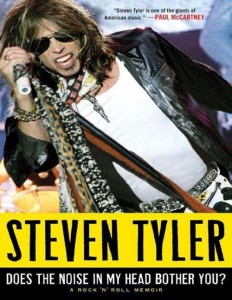Reflections on the Rainy Season, or Maybe Reflections Because of the Rainy Season
There’s nothing like a nice soft rain to lull one into indoor inactivity. A book and a hammock are my first choice, but for those of you with a higher metabolism you might want to find things to do besides gardening, or hiking or any of the outdoor stuff here that is normally so much fun. So, keeping the focus on music, here’s a few things you can do while there’s a deluge going on outside.
If you are going for the book and hammock diversion, there are tons of biographies and auto-biographies out there about musicians. I’ve read bunches of them—from Frank Sinatra to Willie Nelson to Frank Zappa to Linda Ronstadt, and they are all interesting, even the ones about musicians I was never much interested in. Like Steven Tyler—who wins for the best title, Does the Noise in My Head Bother You?
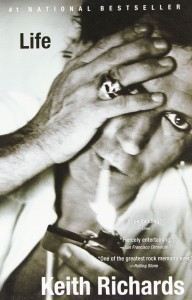 Many are variations on rock star indulgences and their sense of entitlement, backstage cocaine binges and close calls with the police. These can get a bit boring, and certainly redundant. They can also be painfully funny and make you marvel that any of us lived through those times. Keith Richards’ huge volume, Life, was amazing mainly because he remembered so many of the details of his life and career—who would have thought he had that kind of memory left! It also reminded me what a prolific writer he was and is, despite spending much of his time trying to find more and better drugs. ‘Course the search for better drugs is a common life and songwriting theme for my generation of musicians—unfortunately the survivors also think they are entitled to tell us all about their newfound sobriety and personal pact with the deity of their choice. Greg Allman, Eric Clapton, Dr.John, Miles Davis—they all played through their pain and dysfunctional times and now we can not only hear it, but read about it. I enjoy reading about musicians who I admire, and have learned much about the mechanics and business of being a musician through their earnest literary endeavors. I have been surprised at many of their backgrounds and reasons for writing and performing, and am chagrined at the bushels of money we all threw at lawyers and agents and record company leeches and of course, drug dealers.
Many are variations on rock star indulgences and their sense of entitlement, backstage cocaine binges and close calls with the police. These can get a bit boring, and certainly redundant. They can also be painfully funny and make you marvel that any of us lived through those times. Keith Richards’ huge volume, Life, was amazing mainly because he remembered so many of the details of his life and career—who would have thought he had that kind of memory left! It also reminded me what a prolific writer he was and is, despite spending much of his time trying to find more and better drugs. ‘Course the search for better drugs is a common life and songwriting theme for my generation of musicians—unfortunately the survivors also think they are entitled to tell us all about their newfound sobriety and personal pact with the deity of their choice. Greg Allman, Eric Clapton, Dr.John, Miles Davis—they all played through their pain and dysfunctional times and now we can not only hear it, but read about it. I enjoy reading about musicians who I admire, and have learned much about the mechanics and business of being a musician through their earnest literary endeavors. I have been surprised at many of their backgrounds and reasons for writing and performing, and am chagrined at the bushels of money we all threw at lawyers and agents and record company leeches and of course, drug dealers.
Be careful of those books that are clearly ‘unauthorized’. Often they are the result of some opportunistic journalists’ personal agenda or vendetta. So much has already been written about folks like the Beatles, or Bob Dylan, that you have to be a bit suspicious of the authors’ access to information or new insights. Same goes for those books written by the roadies or managers or costume designers or whatever guy backstage thinks he has something new to divulge. I did read a fascinating book recently by a guy named Sam Cutler called You Can’t Always Get What You Want. Cutler worked for and toured with the Stones and the Grateful Dead in the 60s and 70s, and was privy to some incredible political and business decisions, as well as witnessing some legendary combinations of talented musicians in their early stages. His insights into the Altamont disaster and the government’s meddling is illuminating.
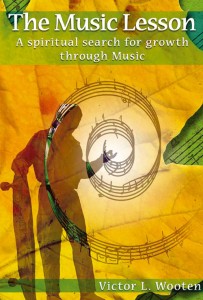 Without a doubt one of the most interesting and insightful books about music, and one that has passed through the hands of every local Quepos/Dominical musician that I know, is called The Music Lesson, written by 5 time Grammy award winning bassist Victor Wooten. Wooten calls the book “A spiritual search for growth through music” and it’s about a teacher who arrives into the life of a young struggling musician, and who is part musical genius, part philosopher, part eccentric wise man, and who teaches his student that the gifts we get through music mirror those we receive in life. A great read, especially accompanied by some thunder and lightning.
Without a doubt one of the most interesting and insightful books about music, and one that has passed through the hands of every local Quepos/Dominical musician that I know, is called The Music Lesson, written by 5 time Grammy award winning bassist Victor Wooten. Wooten calls the book “A spiritual search for growth through music” and it’s about a teacher who arrives into the life of a young struggling musician, and who is part musical genius, part philosopher, part eccentric wise man, and who teaches his student that the gifts we get through music mirror those we receive in life. A great read, especially accompanied by some thunder and lightning.
If you have ever wanted to play an instrument, or sing or write music, then rainy season is a great time to get started. Playing percussion instruments with other folks has scientifically been shown to lower blood pressure, improve all kinds of body functions and get those ‘good time’ endorphins going. So find or make yourself a drum or shaker, pick out a particular rhythm to bang out, and play it for at least 30 minutes every day. Even better if it’s raining outside cause it can be your metronome. If you can’t play a particular beat cleanly and with articulation and consistency for half an hour, then you are not practicing enough. Once you can do that, then a drum circle on the beach or at a festival will be nothing but big fun for you, and will help promote your physical and mental well-being. This is real science folks, so no smirking or underestimating the power of communal jamming.
Turn off the TV reruns and drag out that guitar your brother gave you years ago, get some new strings and find an instructor you like on the internet to guide you. There are kzillions of guys out there making and posting videos about how to learn any instrument or any musical style, so find one and do what they say. Repetition and consistent practice is the key and the secret. I go to the website of this funny, large, redneck kind of guy in overalls who patiently shows how to do stuff on the ukulele, an instrument I am trying to learn how to play. I welcome his approach and learn way faster than I would if left to my own noodling around.
If you like lyrics and poetry and words in general, and are maybe interested in giving songwriting a shot, try writing a parody version of a song you already know and like. Shoot, Weird Al Yankovich made a lifetime career out of changing the words to other peoples’ songs! Once again, get on a computer and look up a song, maybe learn the chords on guitar or piano, or at least listen to it while reading the lyrics so you get an idea of the phrasing and natural cadence of the words. Then change up some words and go where it naturally takes you – this is really good practice and a fun way to learn some writing and music skills so that eventually you can write your own songs! Besides, it’s raining outside and no one can hear you and what else would you being doing anyway, the crossword puzzle?
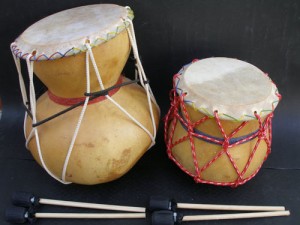 Learning to use and value the natural resources around us is a practical and respectful way to approach living and playing music here. Whether you want to participate in music or drum sessions, or you want to expose youngsters to sounds and rhythms, listen to the natural sounds and take guidance from the ancestors—and start making your own instruments! Our shopping options are few here anyway, and most music stores are obsessed with all things glitzy and electronic—items which are routinely sabotaged by the climate or bugs or the salt air. After all, music started with ingenious usage of the plants and shells and animals available to us from ‘ole Mother Nature. Hollow out a gourd and seal in dried seeds or popcorn or small rocks, then shake it! Or string dried seeds together and wind them around the outside of a hollow gourd and you’ve got a different version of maracas. Stretch animal hide or thin rubber over a round frame, add some bottle caps and you’ve got a tambourine. Make a guiro out of a gourd (usually calabaza) by carving rows of ridges on one side, carve out a sound hole on the other side, then scrape a stick over the ridges. The kind of elongated beat this small but important instrument provides is a main driving force for many Latin rhythms. Claves is the name for two rounded hardwood sticks that make a great sound when whacked together. (Clave is also the name for a 5 beat, measure and a half long rhythmic pattern that’s basically the foundation for many of the rhythms found in Latin music.)
Learning to use and value the natural resources around us is a practical and respectful way to approach living and playing music here. Whether you want to participate in music or drum sessions, or you want to expose youngsters to sounds and rhythms, listen to the natural sounds and take guidance from the ancestors—and start making your own instruments! Our shopping options are few here anyway, and most music stores are obsessed with all things glitzy and electronic—items which are routinely sabotaged by the climate or bugs or the salt air. After all, music started with ingenious usage of the plants and shells and animals available to us from ‘ole Mother Nature. Hollow out a gourd and seal in dried seeds or popcorn or small rocks, then shake it! Or string dried seeds together and wind them around the outside of a hollow gourd and you’ve got a different version of maracas. Stretch animal hide or thin rubber over a round frame, add some bottle caps and you’ve got a tambourine. Make a guiro out of a gourd (usually calabaza) by carving rows of ridges on one side, carve out a sound hole on the other side, then scrape a stick over the ridges. The kind of elongated beat this small but important instrument provides is a main driving force for many Latin rhythms. Claves is the name for two rounded hardwood sticks that make a great sound when whacked together. (Clave is also the name for a 5 beat, measure and a half long rhythmic pattern that’s basically the foundation for many of the rhythms found in Latin music.)
Collect your old obsolete metal keys, string them together with fishing line, hang them in rows from a stick and you have a chime instrument. Cut some different sized coconuts in half, clean them up, mount them on posts about waist high and play them like a drum kit. Fill a dried cactus with small stones, push some of the cactus spikes into the center and you have a rainstick. Ocarinas, or vessel flutes, can be made out of mud or terracotta, and have been found in former Mayan and Aztec regions. They are often in animal or bird shapes, and depending on how many holes there are they can produce one note or a complete scale. Bamboo is a wonderful wood for making all kinds of flute instruments and makes a fine digeridoo. The cajone is a very popular and versatile drum used throughout Central and South America. Build a box out of wood and cut a resonator hole in the front, sit on it and use your hands to beat out rhythms in different places for different tones. Some cajones have small nails put in slightly larger holes or metal springs or coils attached inside to achieve a snare drum sound. Once I started talking to instrument makers and musicians here I was overwhelmed with many great examples of creativity, ingenuity and dedication to their craft. So make yourself some cool instruments and practice with them to the beat of the pouring rain……
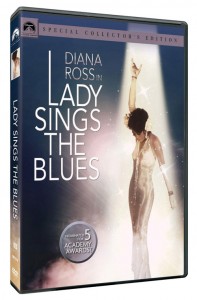 If it’s still raining and you want to settle into spectator status—make yourself some popcorn and watch a movie about music! The best rock and roll movie of all time is, of course, Spinal Tap. Watch it 20 times so you too can annoy your friends by constantly quoting it. Disney’s Fantasia and the Jungle Book are still great classics—for both their music and the art work. Watch the Blues Brothers again, if for no other reason than to see Aretha Franklin wagging her finger at her sax playing old man while singing Think. Watch Amadeus or Lady Sings the Blues or Cadillac Records or Tina Turner in What’s Love Got to Do With It? Roll one and re-visit Woodstock. What the heck, it’s raining.
If it’s still raining and you want to settle into spectator status—make yourself some popcorn and watch a movie about music! The best rock and roll movie of all time is, of course, Spinal Tap. Watch it 20 times so you too can annoy your friends by constantly quoting it. Disney’s Fantasia and the Jungle Book are still great classics—for both their music and the art work. Watch the Blues Brothers again, if for no other reason than to see Aretha Franklin wagging her finger at her sax playing old man while singing Think. Watch Amadeus or Lady Sings the Blues or Cadillac Records or Tina Turner in What’s Love Got to Do With It? Roll one and re-visit Woodstock. What the heck, it’s raining.
Well we don’t care if it’s raining or not—Ben Orton and the Howlers will be playing most Friday nights at the beautiful and spacious Roca Verde, just south of Dominical. They have great food and fun will be had! Check Niven’s Musical Notes on the left sidebar of this page to see who is playing and where—thanks for getting out and getting wet to support live music!
Excuse me while I kiss the sky! Jimi Hendrix
Writing about music is like dancing about architecture. Martin Mull
Music is forever. Music should grow and mature with you, following you right on up until you die. Paul Simon

